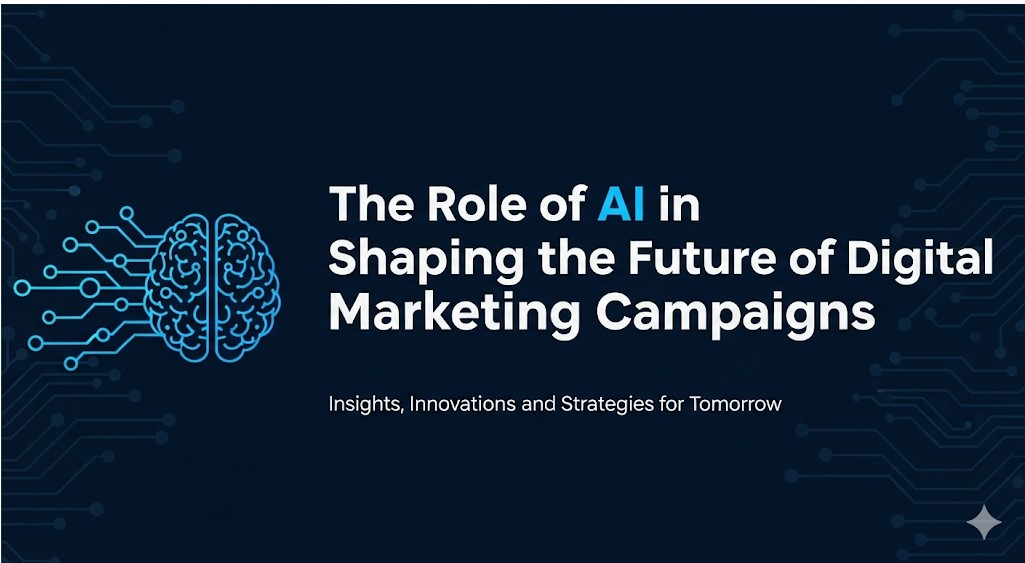Introduction
Digital marketing has always evolved alongside technology—from the early days of email blasts to today’s hyper-targeted campaigns. In 2025, Artificial Intelligence (AI) is at the heart of this evolution, transforming how businesses connect with customers, personalize experiences, and measure campaign success.
Why does this matter? Because in a world where customer expectations are higher than ever, businesses that don’t leverage AI risk falling behind. This blog will explore how AI is shaping digital marketing campaigns, the challenges marketers face, strategies to integrate AI effectively, and what the future holds.
What is AI in Digital Marketing and Why It Matters
AI in digital marketing refers to the use of machine learning, natural language processing, predictive analytics, and automation to optimize campaigns, personalize customer journeys, and improve ROI.
- According to Gartner, by 2025, 80% of customer interactions will be handled by AI-powered tools.
- AI helps marketers process massive amounts of data in real time, allowing brands to deliver personalized, scalable, and relevant experiences.
In digital marketing, AI isn’t just a tool—it’s becoming the engine that powers strategy, execution, and measurement.
Challenges in AI Adoption for Digital Marketing Leaders
While AI offers unmatched opportunities, CMOs and digital marketers face several challenges:
- Data Privacy Concerns
- With stricter laws like GDPR and CCPA, ensuring AI-driven personalization doesn’t cross ethical or legal lines is complex.
- Technology Overload
- Marketers are overwhelmed by a crowded AI tool landscape, making it difficult to select the right platforms.
- Integration Issues
- Combining AI tools with existing martech stacks (CRMs, CDPs, automation platforms) often requires significant investment and expertise.
- Talent Gap
- Many marketing teams lack AI specialists who can interpret data insights into actionable strategies.
Real-world example: A B2B SaaS company implemented AI for lead scoring but struggled because its CRM wasn’t fully integrated, resulting in lost opportunities.
Proven Strategies to Leverage AI in Digital Marketing
To make AI an advantage rather than a challenge, digital marketing leaders should focus on practical adoption strategies:
1. Personalization at Scale
AI allows you to deliver 1:1 personalization across multiple channels (email, ads, chatbots, websites).
- Tools: Dynamic Yield, Adobe Sensei, Salesforce Einstein.
- Best practice: Use predictive models to recommend the right content at the right time.
2. Predictive Analytics for Smarter Decisions
AI predicts which customers are most likely to convert, churn, or upgrade.
- Tools: HubSpot AI, Google Analytics Predictive Metrics.
- Action step: Use predictive lead scoring to help sales teams prioritize high-value prospects.
3. Conversational AI and Chatbots
AI-driven chatbots are becoming digital marketing assistants, offering 24/7 customer engagement.
- Example: Drift and Intercom bots that qualify leads before handing them to sales.
4. AI in Content Creation & SEO
AI tools can generate, optimize, and distribute content.
- Tools: Jasper AI, MarketMuse, Clearscope.
- Best practice: Use AI for content recommendations and SEO keyword clustering to boost rankings.
5. Automated Campaign Optimization
AI can analyze real-time performance and adjust ad bidding, audience targeting, and creative placement.
- Platforms: Google Ads Smart Bidding, Meta Advantage+.
- Pro tip: Set clear KPIs so AI optimizations align with business goals.
Trends and the Future of AI in Digital Marketing (2025 and Beyond)
- Hyper-Personalization with Generative AI
- Campaigns will be tailored to individual behaviors in real-time using AI agents.
- AI-Powered Search (Conversational & Visual)
- With ChatGPT, Google Gemini, and voice assistants rising, SEO strategies will shift from keywords to conversational queries.
- Privacy-First AI Marketing
- AI will rely more on first-party and zero-party data, ensuring compliance with privacy laws.
- AI-Powered Creative Testing
- Marketers will increasingly use AI for A/B/n testing across video, display, and interactive ads.
- AI Agents for Full-Funnel Marketing
- Instead of just handling tasks, AI agents will manage entire workflows—from audience research to campaign optimization.
Pro Tips & Bonus Insights
- Start small with AI pilots, then scale successful use cases.
- Invest in explainable AI (XAI) tools to build trust with stakeholders.
- Combine human creativity with AI efficiency—AI is best at scaling, but humans bring brand storytelling.
Conclusion
AI is not just another marketing trend—it’s the foundation of digital marketing in 2025 and beyond. By embracing AI for personalization, predictive analytics, SEO, and automation, brands can stay ahead of competitors and deliver experiences that truly resonate with customers.
The future belongs to marketers who balance technology, creativity, and ethics in their campaigns.
👉 Ready to transform your digital marketing with AI-driven strategies? Contact the experts.
